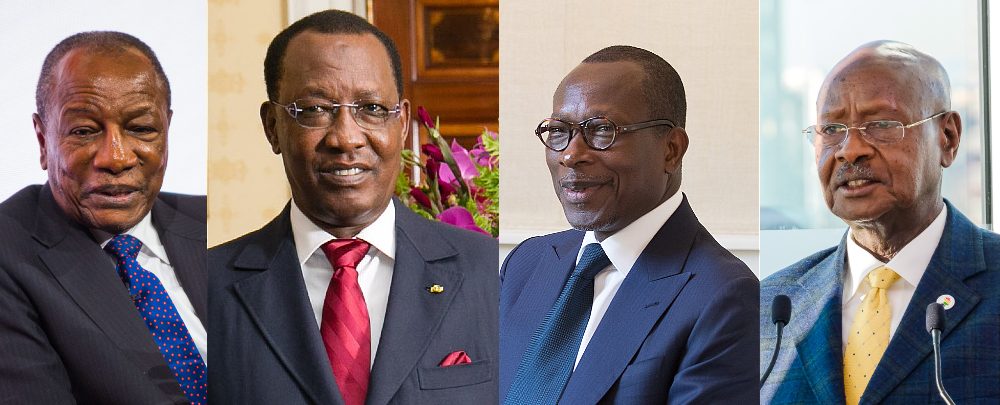
From left: Presidents Alpha Condé of Guinea, Idriss Déby of Chad, Patrice Talon of Benin, and Yoweri Museveni of Uganda. (Photos: DFID-UK, Amanda Lucidon, Présidence de la République du Bénin, DFID-UK/Graham Carlow)
Africa saw a precipitous decline in the upholding of term limits in 2020. Of the 12 presidential elections held on the continent, five had incumbents facing term limits. Yet, in only one case, Niger’s President Mahmadou Issoufou, did the incumbent abide by this limit. Conversely, Faure Gnassingbé (Togo), Alpha Condé (Guinea), and Alassane Ouattara (Côte d’Ivoire) all remain in power. Pierre Nkurunziza, who bypassed Burundi’s two-term limit in 2015, died prior to this year’s election.
This circumvention of term limits continues a recent trend. Since 2015, there have been 13 cases of African leaders extending their time in power beyond their mandated two terms.
This is a problem for Africa’s governance, security, and development. Leaders in countries where leaders have evaded term limits have been in power four times longer, on average, than leaders in countries upholding term limits. Countries where leaders have eluded term limits, moreover, are ranked as considerably more corrupt, according to Transparency International.
Not coincidentally, 11 of the 14 African countries currently facing civil conflict are those without effective term limits. These countries generate roughly 90 percent of the continent’s record 30 million refugees and internally displaced populations.
Citizens peacefully protested the lifting of term limits in each country in question this year. Yet, in every case, government crackdowns resulted in the loss of lives. Regional bodies and international actors, meanwhile, have remained largely silent.
The deterioration in term limit norms is undercutting more than two decades of reform aimed at institutionalizing checks and balances on executive power in Africa. Some 45 African countries had at one point adopted term limits. Currently, only 21 uphold these limits. Left unchecked, this deterioration is a harbinger of a return to de-facto one-party political systems that many thought Africa had left behind.
The United States shares values and interests with the millions of Africans calling for term limits as a means to overcome the legacy of “big man” politics. The evasion of term limits does not occur in isolation, but is part of a pattern of skirting the rule of law, civil liberties, property rights, and contract enforcement. Such an environment will have a chilling effect on broader Africa-U.S. relations, affecting security cooperation, investment, the generation of jobs, and the continued expansion of Africa’s middle class.
This piece originally appeared in Africa Year in Review 2020 published by the Wilson Center.
More on: Democratization Governance

